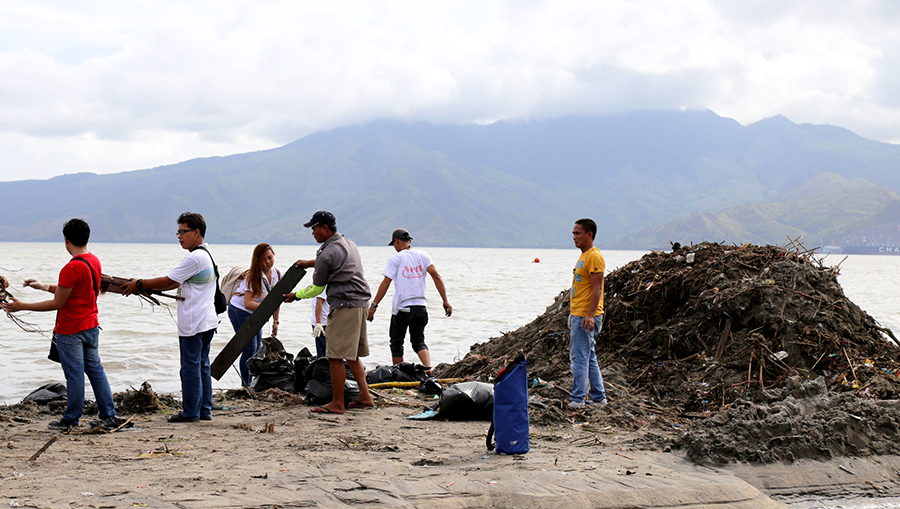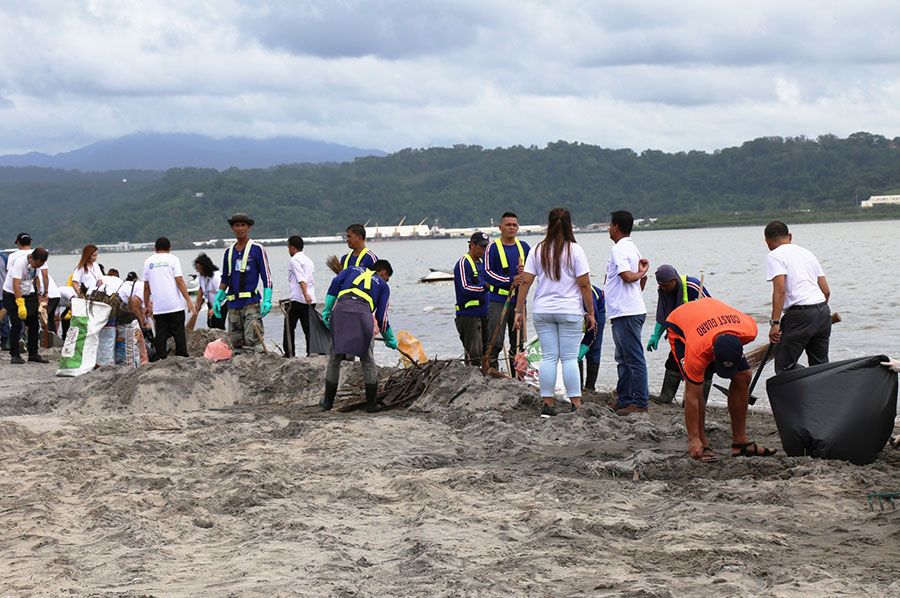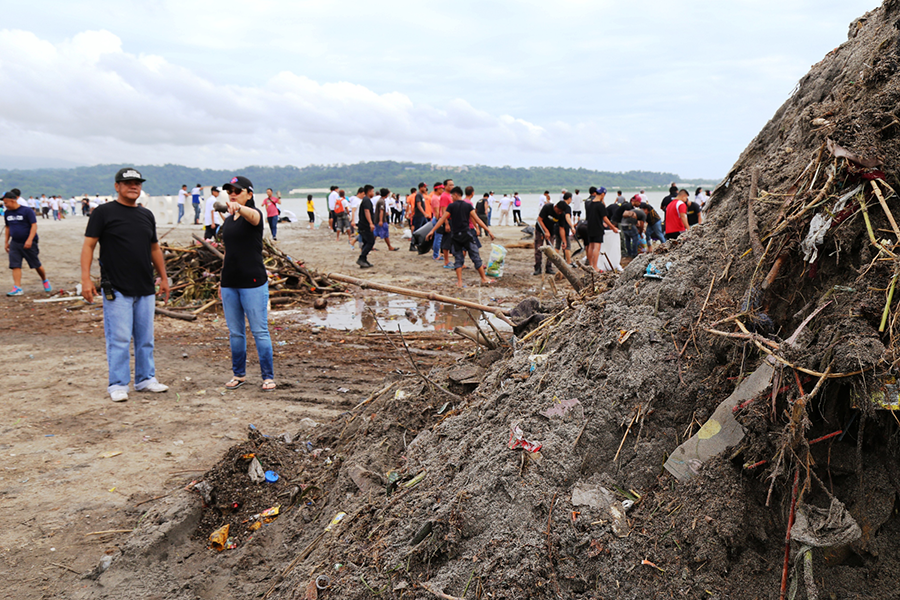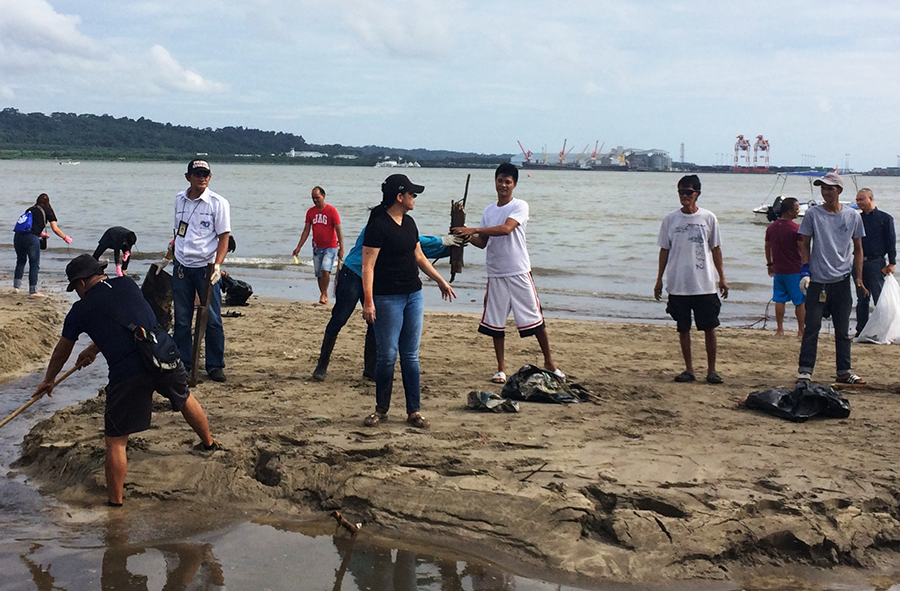
SUBIC BAY FREEPORT — Stakeholders in the Subic Bay area gathered here on Monday to help the Subic Bay Metropolitan Authority (SBMA) clean up a shoreline littered with tons of debris brought about by the storm last week.
Heeding a call for “bayanihan” from SBMA Chairman and Administrator Wilma T. Eisma, agency employees, company workers, and students trooped to four cleanup stations at the waterfront, armed with nothing else but rakes, shovels, brooms, and a strong sense of community.
A delegation from Olongapo City headed by Mayor Rolen Paulino and Vice Mayor Jong Cortez also arrived to boost both spirit and manpower during the clean-up, bringing with them two pay-loaders to help speed up the hauling of mostly tree branches, plastic materials and other solid wastes.

 Volunteers troop to the waterfront in the Subic Bay Freeport to help clean up debris washed on the shore during Typhoon Domeng.
Volunteers troop to the waterfront in the Subic Bay Freeport to help clean up debris washed on the shore during Typhoon Domeng.
Meanwhile, Subic Grain Pro, a company based in the Freeport, donated gloves, broomsticks, garbage bags and empty sacks, as well as bread and sandwiches, water and noodles for use by the volunteers.
An automotive seller, the Subic Truck Boy, also lent a pay-loader and a dump truck to augment SBMA equipment used in digging, collecting and hauling trash from the beach.
SBMA Chairman Eisma made the call for beach cleanup and waste segregation over the weekend, as various trash washed up on the shores of this tourism center following a week of incessant heavy rains.

 SBMA Chairman Amy T. Eisma (in cap and eyeglasses) directs the clean-up project along the waterfront in the Subic Bay Freeport after Typhoon Domeng.
SBMA Chairman Amy T. Eisma (in cap and eyeglasses) directs the clean-up project along the waterfront in the Subic Bay Freeport after Typhoon Domeng.
“We had to remove the debris that piled up, and then segregate and dispose of them, and that was a huge job,” Eisma noted. “It is really heartwarming to see the whole community responding to our call for assistance, for them to show their ‘malasakit’ for the Subic Freeport.”
Vice Mayor Cortez said the instantaneous collaboration between the SBMA and the city government “showed that the two government institutions can come together swiftly as one for the love of the community and concern for environment.”
“The residents of Olongapo, Zambales and Bataan have a deep sense of community, especially in matters of the environment. After all the sea, forest, air and water are resources that are common to all,” he added.
Eisma said the pile-up of storm debris is a constant problem during the rainy season for the SBMA, which has been promoting Subic not only as a business enclave, but also as a tourism center.
At least seven major rivers empty into the bay of Subic, which straddles a good part of the 67,000-hectare area of the Subic Bay Freeport Zone. These are the Pamulaklakin and Boton rivers in the Subic Bay Freeport; Kalalake, Sta. Rita-Kalaklan, and Maquinaya rivers in Olongapo; and Matain and Calapandayan rivers in Subic, Zambales.
Subic Bay, which forms the communal waters of Olongapo, and Zambales and Bataan, had been described as a threatened resource largely due to trash inflows from its tributaries.
Eisma said this is an environmental problem that transcends the geographical boundaries of communities near the Subic Bay.
“We’re all affected by this problem, and that is why we—the Subic Freeport, Olongapo, Zambales and Bataan—should work together to deal with it and come up with effective solutions,” she said.
Eisma said that another clean-up has been scheduled this week to cover the rest of the two-kilometer waterfront at the Freeport’s Central Business District, and that she hopes again to muster support from various Subic stakeholder groups.
“We’re getting better at this bayanihan projects because we have ingrained upon our stakeholders the value of malasakit,” Eisma said. “Everybody helps, and everybody wins.” (Dante M. Salvana)